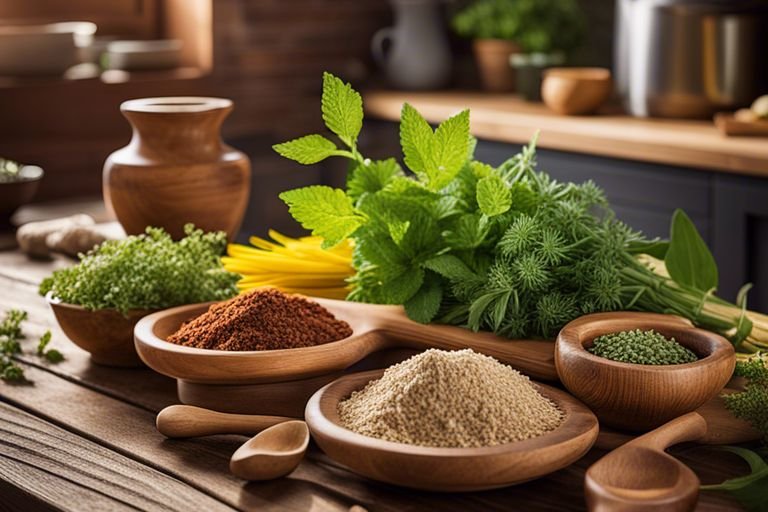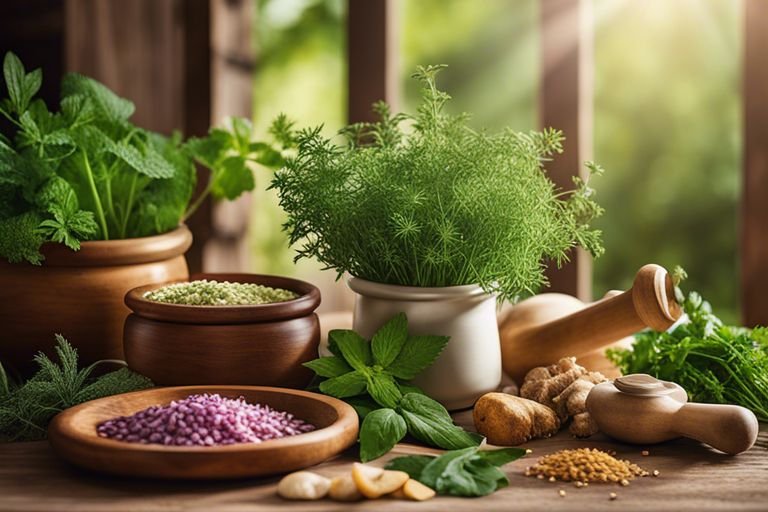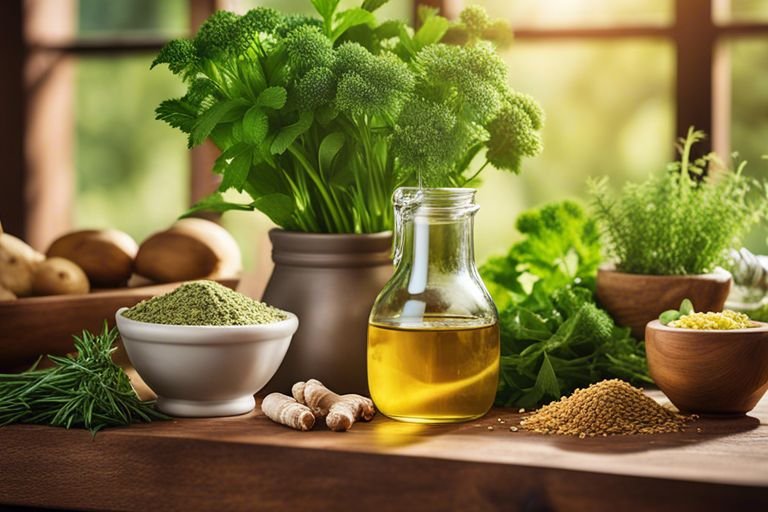Most people experience digestive issues at some point in their lives, and finding natural remedies can enhance your overall well-being. In this informative guide, you will discover the best herbal solutions specifically designed to support and improve your digestive health. From time-honored herbs to modern herbal blends, you’ll learn how these natural ingredients can alleviate discomfort, promote gut health, and restore balance in your digestive system. Embrace the power of nature’s medicine and empower yourself with the knowledge to enhance your digestive well-being.

Key Takeaways:
- Natural Remedies: Emphasizes the effectiveness of herbal solutions in promoting digestive health.
- Common Herbs: Discusses the benefits of widely used herbs like ginger, peppermint, and fennel for common digestive issues.
- Holistic Approach: Advocates for a holistic approach to health, integrating diet, lifestyle, and herbal medicine.
- Personalization: Highlights the importance of personalized herbal strategies tailored to individual digestive needs.
- Safety and Efficacy: Stresses the need for awareness regarding the safety and efficacy of herbal remedies to avoid adverse effects.
Understanding Digestive Health
To appreciate the holistic benefits of herbal solutions for digestive health, you must first understand the intricate workings of your digestive system. Your digestive system is a complex network of organs responsible for breaking down the food you eat into nutrients that your body can absorb and utilize. From the moment food enters your mouth until it exits your body, each step involves a series of mechanical and chemical processes. The primary components include the mouth, esophagus, stomach, intestines, liver, pancreas, and gallbladder, all of which play crucial roles in digestion and nutrient absorption.
The Digestive System: An Overview
One of the key functions of your digestive system is to transform the food you consume into energy that fuels your body. Each organ specializes in specific tasks; for example, your stomach utilizes acid and enzymes to break down food, while your intestines absorb the resulting nutrients. This fascinating process not only provides your body with imperative energy but also supports overall health by maintaining a balanced ecosystem of gut bacteria imperative for various bodily functions.
Common Digestive Disorders
On the other hand, many individuals experience digestive disorders that disrupt these vital processes. Common conditions include irritable bowel syndrome (IBS), gastroesophageal reflux disease (GERD), and food intolerances, all of which can significantly impact your quality of life. Symptoms may range from bloating and abdominal pain to diarrhea or constipation, often causing discomfort and frustration in your daily activities.
The prevalence of digestive disorders highlights the importance of addressing these issues proactively. Many people experience symptoms related to digestion at some point in their lives, and for some, these disorders become chronic. Identifying the underlying causes, whether they be dietary choices, stress, or imbalances in gut bacteria, is imperative to finding effective relief and restoring your digestive health.
Importance of Digestive Health
With the increasing prevalence of digestive issues in modern society, understanding the importance of digestive health is key to your overall well-being. A well-functioning digestive system not only supports nutrient absorption but also plays a vital role in maintaining your immune system, hormone regulation, and mental well-being. This intricate connection between digestion and other bodily systems underscores the necessity of prioritizing your digestive health.
Common ailments such as chronic bloating, fatigue, and even skin conditions can often be traced back to an imbalance in your digestive system. By paying attention to what you eat, how you manage stress, and how your body responds, you can foster an environment conducive to better digestion and improved overall health. Taking steps to support your digestive health, such as incorporating herbal solutions, will not only enhance your digestive function but also contribute to a greater sense of vitality in your everyday life.
Traditional Herbal Remedies
While modern medicine has made significant strides in treating digestive health issues, traditional herbal remedies offer a time-honored alternative that many people still rely on today. These natural solutions have been utilized for centuries across different cultures and are often rooted in the wisdom of generations past. By understanding these historical practices, you can gain insights into how herbs can effectively support your digestive system.
Historical Use of Herbs in Digestive Health
To appreciate the role that herbs have played in digestive health, it’s crucial to look back at their use in ancient civilizations. In cultures such as the Chinese, Indian, and Egyptian, herbal remedies were developed not just for their medicinal qualities but also to promote overall wellness. Ingredients like ginger, peppermint, and fennel were commonly used to soothe digestive upsets, aiding in issues such as bloating, gas, and indigestion. These practices relied on the holistic understanding that a balanced digestive system is crucial for overall health.
To this day, many of these age-old remedies continue to be relevant as they are supported by both anecdotal evidence and emerging scientific research. You might find that incorporating these herbs into your routine can provide a natural complement to modern dietary practices, serving as a gentle reminder of the natural solutions that have stood the test of time.
Key Herbal Practices from Around the World
One of the most fascinating aspects of traditional herbal remedies is the diverse practices that have emerged around the globe. Different cultures have their unique approaches to using herbs for digestive health, drawing on local flora and traditional knowledge. For example, in Traditional Chinese Medicine (TCM), the concept of “Qi” or energy flow is paramount, and herbs like licorice and hawthorn are used to harmonize digestion and alleviate discomfort. Similarly, Ayurveda, the ancient Indian healing system, utilizes spices like cumin and coriander to enhance digestion and absorption of nutrients.
Herbal remedies are not simply limited to a single region; they encompass a variety of practices and preparations. From herbal teas and tinctures to infusions and powders, the ways in which you can incorporate these traditional solutions into your daily routine are numerous. By leveraging the time-tested wisdom of global herbal practices, you may find effective and natural means to promote your digestive health.

Essential Herbs for Digestive Health
For anyone seeking natural solutions to enhance their digestive health, the world of herbal remedies offers a wealth of options. Each herb brings unique properties that can relieve discomfort, promote gut health, and support overall wellness. You can explore different Vitamins & Supplements | Purchase Herbal … options to ensure you find the right balance for your digestive system.
Aloe Vera: Soothing the Gut
The soothing properties of Aloe Vera make it an excellent choice for maintaining digestive health. This succulent plant contains enzymes that aid in breaking down sugars and fats, making it easier for your body to digest food. Furthermore, Aloe Vera is known to possess anti-inflammatory properties that can help alleviate symptoms of gastrointestinal problems, including ulcers and acid reflux.
Incorporating Aloe Vera into your daily routine can also enhance your overall gut health. Whether consumed as a juice or in supplement form, this versatile herb can help restore balance to your digestive system, promoting a healthier and more comfortable experience after meals.
Ginger: A Natural Anti-Nausea Solution
AntiNausea properties of Ginger have long been celebrated in herbal medicine. This potent root is well-known for its ability to combat nausea and support digestion. Whether you’re dealing with motion sickness, morning sickness during pregnancy, or simply an upset stomach, ginger can help minimize these sensations and allow you to feel at ease. The compounds found in ginger stimulate saliva, bile, and gastric enzymes, contributing to more effective digestion.
Digestive benefits of ginger don’t stop at nausea relief. By improving blood circulation and reducing inflammation in the digestive tract, ginger can aid in alleviating symptoms associated with bloating and discomfort after meals. Including ginger in your diet, whether through teas, capsules, or fresh in your dishes, can promote your overall digestive well-being.
Peppermint: Relief from Bloating and Discomfort
Bloating and discomfort after meals are common issues that many people experience. Peppermint is a fantastic herbal ally in relieving these symptoms. The menthol in peppermint has a relaxing effect on the muscles of the gastrointestinal tract, which can help ease spasms and promote smoother digestion. Additionally, its aromatic compounds can help activate digestive enzymes, further assisting your body in processing food more effectively.
Vera often works in tandem with your body’s natural functions to induce a sense of calm. When sipping on peppermint tea or using peppermint oil in a diffuser, you might find not just relief from bloating but also an enhancement in your overall digestion, making it a must-have herb for your wellness toolkit.
Fennel: Easing Gas and Indigestion
Discomfort caused by gas and indigestion can be quite bothersome. Fennel seeds have been used for centuries as a digestive aid, thanks to their carminative properties that help reduce bloating and gas. The compounds found in fennel can help relax the muscles in the gastrointestinal tract, which may alleviate cramping and discomfort associated with indigestion.
Herbs like fennel can play an vital role in your herbal digestive health routine. You can enjoy fennel tea or chew on fennel seeds after meals to support your digestion, keeping uncomfortable symptoms at bay and promoting better nutrient absorption in your body.
Chamomile: Calming the Digestive Tract
Health and wellness often start with a calm mind and body. Chamomile is renowned for its calming properties, making it an excellent choice for easing digestive issues linked to stress and anxiety. The anti-inflammatory and antispasmodic effects of chamomile can help relax the muscles of the gastrointestinal tract, reducing discomfort and promoting overall digestive harmony.
It can be beneficial for those who experience digestive issues triggered by stress or anxiety. By incorporating chamomile tea into your nighttime routine or as a soothing remedy throughout the day, you can foster a serene environment for your digestive system, improving your overall gut health.

Preparing Herbal Remedies
Unlike over-the-counter medications that often come with a long list of side effects, herbal remedies offer a more natural approach to digestive health. Preparing these herbal solutions can not only enhance your well-being but also provide a deeper connection to the plants that nurture your body. If you’re interested in a comprehensive perspective, check out the HERBAL SOLUTION FOR DIGESTIVE UPSET: Holistic … to learn more about how herbs can help you maintain a balanced digestive system.
Different Forms of Herbal Remedies
Herbal remedies come in various forms, each catering to different preferences and practices. You can find dried herbs, tinctures, capsules, and powders that allow you to choose what best fits your lifestyle. Dried herbs are often used for teas or cooking, while tinctures are concentrated extracts that can be added to water or taken directly. Capsules and powders provide convenience for those on the go but may lack the sensory experience of preparing a tea.
When opting for a form of herbal remedy, consider your needs and lifestyle. If you prefer the ritual of brewing your own tea, dried herbs may be ideal. Conversely, if you are looking to integrate herbs seamlessly into your routine, tinctures or capsules might be more suitable. Understanding these options is vital for maximizing the effectiveness of your herbal remedies.
How to Brew Herbal Teas
With herbal teas, you have an excellent opportunity to harness the healing properties of plants in a comforting and soothing manner. Start by selecting high-quality dried herbs that are known for their digestive benefits, such as peppermint, ginger, or chamomile. To brew your tea, use one teaspoon of dried herbs per cup of water. Bring the water to a boil, then pour it over the herbs and allow them to steep for about 5 to 10 minutes. Covering the tea while it steeps can help retain the aromatic oils.
Remedies are as much about the process as they are about the ingredients. Letting the herbs steep longer enhances their flavors and nutritional benefits, so feel free to adjust your steeping time based on personal preference. If you’re experimenting with different herbs, maintain a journal to note which combinations work best for you and how they impact your digestive health.
Incorporating Herbs into Your Diet
For those looking to enhance their digestive health, incorporating herbs into your diet can be both enjoyable and beneficial. Fresh herbs such as cilantro, parsley, and basil can easily be added to salads, smoothies, or main dishes to not only improve flavor but also support your digestive system. Similarly, dried herbs can be sprinkled over foods or used in marinades, allowing you to enjoy their health benefits in various meals.
Herbal infusions are yet another way to include these beneficial plants in your everyday routine. Try adding food that contains digestive-supportive herbs to your plate regularly, along with trying to incorporate them into snacks. Whether you enjoy cooking or simply adding a bit of green to your table, the right herbs can elevate your meals while promoting optimal digestive health. By being creative with your culinary choices, you can unlock the full potential of nature’s remedies.
Safety and Efficacy of Herbal Solutions
All herbal solutions hold the potential for both safety and efficacy when used appropriately. However, understanding the intricacies of herbal medicine is crucial to ensure you achieve the desired results without adverse effects. Each herbal remedy interacts uniquely with the body, and knowledge of how they function can better inform your choices for digestive health. As you explore different herbal options, it’s imperative to research their dosages, side effects, and any potential interactions they may have with other medications you might be taking.
Understanding Herbal Dosages
To effectively use herbal remedies, you must grasp the concept of dosages. Unlike pharmaceutical drugs that often come with explicit dosage guidelines, herbal remedies require a more nuanced understanding. Factors such as the form of the herb (e.g., tea, capsule, or tincture), the specific ailment you’re addressing, and your individual body chemistry all play a vital role in determining the appropriate dosage. It is advisable to start with the lowest effective amount to gauge how your body reacts.
To further ensure effective use of herbal solutions, consider consulting reputable sources or healthcare professionals who specialize in herbal medicine. They can provide valuable insights into recommended dosages tailored to your circumstances, helping you safely incorporate herbs into your digestive health regimen.
Potential Side Effects and Interactions
With the growing popularity of herbal solutions for digestive health, it’s important to remain mindful of their potential side effects and interactions with other medications. Just like any other treatment, herbs can have adverse effects ranging from mild gastrointestinal discomfort to more severe allergic reactions. You should remain vigilant and pay attention to how your body responds to any new herbal regimen and adjust your use accordingly.
Understanding the potential interactions is equally important, especially if you are currently taking prescription medications. Certain herbs can enhance or diminish the effects of your medication, leading to unintended consequences. It’s imperative to conduct thorough research and consider consulting with a healthcare provider before combining herbal solutions with your current treatment plan.
When to Consult a Healthcare Professional
Efficacy in using herbal remedies starts with understanding when to involve a healthcare professional. If you are experiencing persistent digestive issues or considering a radically different approach to your health using herbs, seeking advice from a qualified practitioner can provide you with tailored recommendations. They can guide you on which herbs might be best suited for your specific conditions and teach you how to safely incorporate them into your daily routine.
Another important consideration is if you are pregnant, nursing, or have chronic health conditions. In these instances, expert guidance can help you navigate the complexities of herbal use, ensuring both your safety and the safety of your dependent or underlying health issues. Prioritizing your health and informed choices will empower you on your journey to better digestive health through herbal solutions.
Lifestyle Changes to Enhance Digestive Health
Now, understanding how to improve your digestive health goes beyond just herbal solutions; incorporating certain lifestyle changes can have a profound impact on how your body processes food and nutrients. Modifying your daily habits can help create a more conducive environment for digestion and overall gut health. With a combination of dietary adjustments, hydration, stress management techniques, and exercise, you can pave the way for better digestive function and a happier gut.
The Role of Diet in Digestive Health
The food you consume plays a crucial role in determining the health of your digestive system. Incorporating a diet rich in fiber, including whole grains, fruits, and vegetables, can help maintain regular bowel movements and prevent constipation. Additionally, fermented foods such as yogurt and kimchi introduce beneficial probiotics into your gut, promoting a balanced microbiome. It’s important to identify and limit foods that trigger your digestive discomfort, such as processed foods, excessive sugar, and high-fat items, to see improvements in your overall digestive health.
The timing of your meals is also important. Eating smaller, more frequent meals rather than large, heavy ones can reduce the burden on your digestive system. This practice not only helps in the efficient breakdown of food but also avoids feelings of bloating and discomfort. Paying attention to your body’s hunger and fullness signals can guide you toward healthier eating habits that ultimately benefit your digestive health.
Importance of Hydration
To support your digestive health, adequate hydration is paramount. Your digestive system relies on water to break down food, absorb nutrients, and eliminate waste. When you’re dehydrated, the entire digestive process can slow down, leading to issues such as constipation. Aim to drink at least eight glasses of water a day, adjusting this amount based on your activity level and climate. Herbal teas, low-sugar smoothies, and hydrating foods like cucumbers and watermelon can also contribute to your daily water intake.
Importance of hydration cannot be overstated. Besides facilitating digestion, water helps in the production of digestive juices and enzymes that are crucial for breaking down food. Additionally, it supports liver and kidney function, which are important for detoxifying your body and keeping your digestive system running smoothly. Ensuring you are well-hydrated not only maintains your digestive health but also enhances your overall well-being.
Stress Management Techniques
Management of stress is vital for gastrointestinal health. Stress can lead to a plethora of digestive issues, including indigestion, bloating, and even irritable bowel syndrome (IBS). Implementing stress-reducing techniques such as mindfulness, meditation, and deep breathing exercises can make a significant difference in how you feel physically and mentally. Engaging in regular physical activity can also help alleviate stress and improve digestive function, creating a positive feedback loop for your health.
Role of stress management cannot be overlooked when it comes to digestive health. By addressing the emotional and psychological components of everyday life, you’re not only improving your mental well-being but also positively impacting your gut health. Regular practices such as yoga or tai chi can enhance relaxation and thereby improve your body’s natural ability to digest food efficiently. Prioritizing stress management will empower you to take control of your digestive health and improve your overall quality of life.
Conclusion
Taking this into account, it is important for you to recognize the power of herbal solutions in promoting digestive health. Nature offers a plethora of herbs with proven benefits, such as peppermint, ginger, and chamomile, which can alleviate common digestive issues like bloating, gas, and discomfort. By integrating these herbal remedies into your daily routine, you can support your digestive system while also embracing a more holistic approach to wellness. A strong understanding of how these natural healers work can empower you to make informed choices about your health and well-being.
Furthermore, as you explore these options, remember that individual experiences may vary, and it’s beneficial to pay attention to how your body responds to different herbs. Consulting with a healthcare professional can provide additional insights tailored to your unique digestive needs. By unlocking nature’s medicine, you are taking proactive steps towards improving your digestive health, ultimately enhancing your overall quality of life. The journey to better health begins with the choices you make today, so embrace the wisdom of herbal solutions for a happier, healthier tomorrow.
FAQ
Q: What is “Unlocking Nature’s Medicine – The Best Herbal Solutions For Digestive Health” about?
A: This book presents a comprehensive guide to using herbal remedies to promote and maintain digestive health. It explores various herbs known for their beneficial effects on the digestive system, providing insights into their properties, preparation methods, and how they can effectively support digestive disorders such as bloating, constipation, and irritable bowel syndrome.
Q: Who can benefit from the herbal solutions discussed in this book?
A: “Unlocking Nature’s Medicine” is suitable for anyone seeking natural alternatives to support digestive health, including individuals with chronic digestive issues, those interested in holistic health practices, and even health practitioners looking to incorporate herbal solutions into their practice. The information is designed to be accessible for both novices and experienced herbalists.
Q: Are the herbal remedies safe to use, and are there any potential side effects?
A: While many herbs are safe for most individuals when used correctly, it is imperative to consider individual health conditions and potential interactions with medications. The book emphasizes the importance of consulting with a healthcare professional before starting any new herbal regimen, especially for individuals with pre-existing health conditions or who are pregnant and nursing.
Q: How are the herbal solutions in the book prepared and consumed?
A: The book provides detailed instructions on various preparation methods, including teas, tinctures, capsules, and poultices. Each section includes specific recommendations on dosages, duration of use, and the best times to consume each remedy to maximize its benefits for digestive health.
Q: Can the herbal solutions in this book be used alongside conventional medicine?
A: Yes, many herbal remedies can be used in conjunction with conventional treatments. However, it is crucial to consult with a healthcare professional to ensure compatibility and avoid any adverse interactions. The book encourages readers to take an integrated approach to their health, combining conventional medicine with natural solutions effectively.

